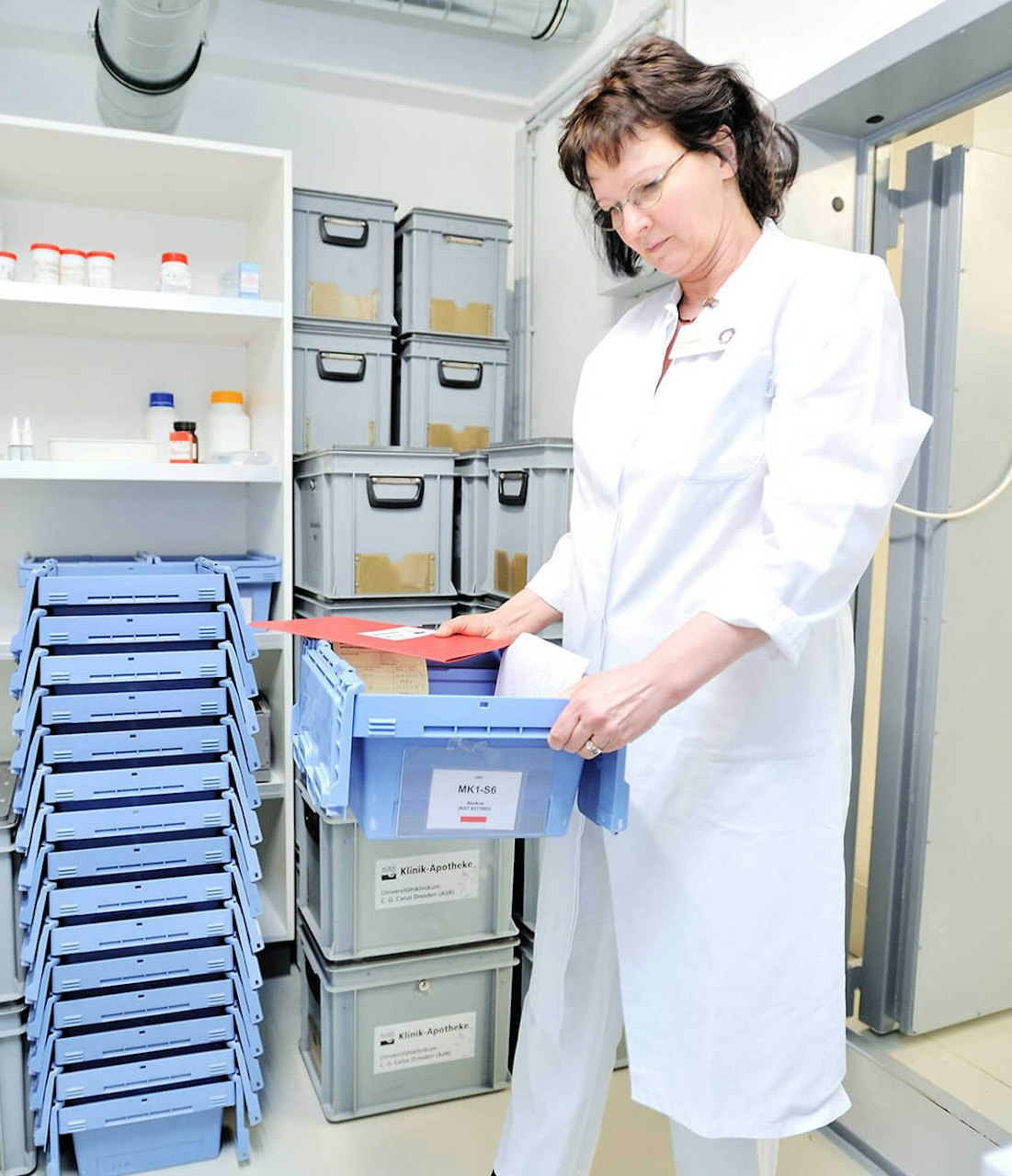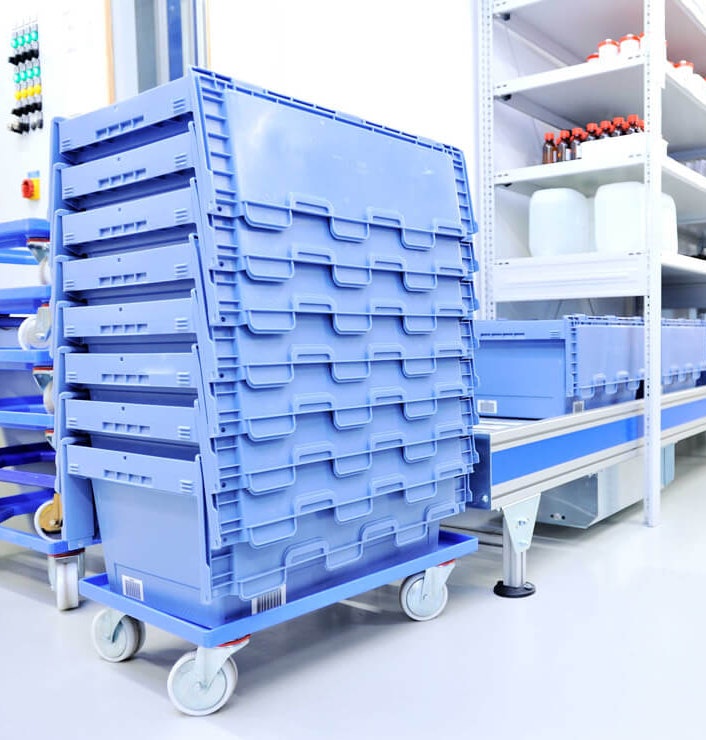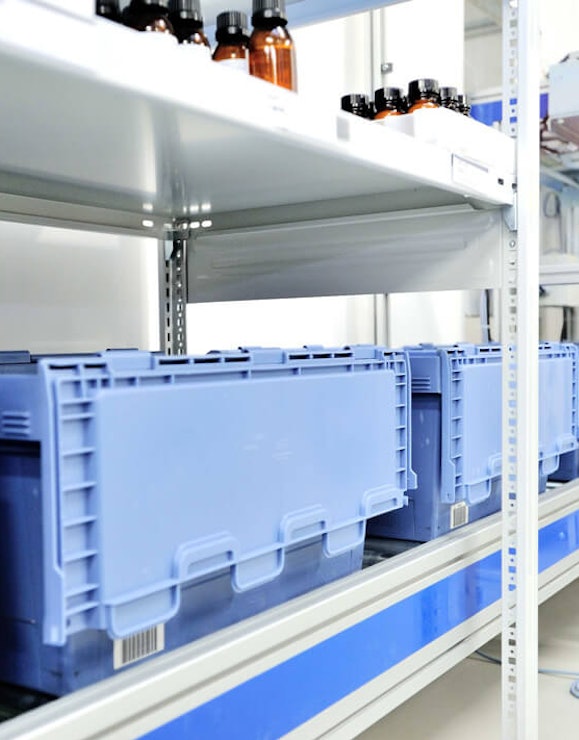Facts & Challenges

The healthcare industry comprises many different players. These include hospitals, clinics and medical surgeries, pharmaceutical and medical technology companies, pharmaceutical wholesalers and pharmacies, digital health companies, the wellness and fitness industry, research institutes, health insurance companies, government and regulatory authorities and, of course, logistics services providers. The healthcare sector and the healthcare system have been undergoing change for a number of years, a change that has been accelerated by the pandemic. In its previous form, the German healthcare system has had its day and is now being shaped by new social and technological trends. Influencing factors are political framework conditions, health trends, demographic change, technological possibilities, issues such as environmental protection and sustainability as well as the necessary increase in efficiency. The population is getting older and older, which means that chronic diseases are on the rise. The healthcare sector is currently being shaped by many trends and endeavours. One megatrend is digitisation, which is leading to new opportunities such as the analysis of big data using artificial intelligence (AI) to increase the efficiency of all processes. Examples include the electronic patient file (ePA), telemedicine, augmented and virtual reality (AR, VR), AI-controlled preventive medicine, cloud computing, wearables, medical apps, medical robots and medicine in the metaverse. The entry of internet giants such as Amazon, Alibaba, Apple, Samsung and Tencent into the healthcare sector is increasingly blurring industry boundaries. Patient treatment is set to become increasingly accurate and personalised. Individual health indicators are monitored on the basis of patient history and sensor data, and forecasts are made for future illnesses. Another megatrend is sustainable healthcare. Hospitals and medical facilities are endeavouring to reduce their ecological footprint. Other sustainability trends include green procurement and logistics, waste reduction and recycling, a better medication management and compliant disposal, sustainable design principles for new hospitals and clinical facilities and, of course, training and education in sustainability practices. Hospital at Home (HaH) services are increasingly being used to relieve the burden on hospitals and save costs. By receiving care at home, patients can enjoy the comfort and familiar surroundings of their own home while still receiving the necessary medical treatment and care. This can reduce costs in the healthcare system by avoiding or shortening inpatient hospital stays.

According to the German Pharmaceutical Industry Association (BPI), around 675 pharmaceutical companies are registered in Germany. This includes both research-based pharmaceutical companies and companies that produce generics, OTC drugs (over-the-counter medicines) and other pharmaceutical products. Around 60,000 medicines are licensed in the country. 2,000 of these are medicines requiring refrigeration and around 250 are medicines requiring cold chain storage. They require appropriate handling during storage and transport. Pharmaceutical wholesalers supply retail pharmacies, online pharmacies, hospital pharmacies, etc. with the products of pharmaceutical manufacturers, thereby performing a logistical feat. Orders are usually processed in several high-performance order picking centres spread across Germany. Some wholesalers have a maximum stock turnaround time of 25 minutes, with delivery usually taking place within 1.5 hours of receipt of the order.
The logistics division of wholesalers must guarantee very fast same-day deliveries. This requires large warehouses. Of course, pharmaceutical manufacturers also need warehouses. Some special features apply to pharmaceutical warehouses. The requirements of the product groups to be stored in terms of temperature, storage conditions, cleanliness requirements or with regard to the Narcotics Act in the pharmaceutical industry are very strict and must be complied with at all times. Good Distribution Practice helps to control the distribution chain and protect against counterfeit medicines. The aim is to maintain the quality and integrity of pharmaceuticals. In Germany, compliance with GDP requirements is legally stipulated by the German Medicinal Products Act (AMG) and the German Ordinance on the Manufacture of Medicinal Products and Active Pharmaceutical Ingredients (AMWHV). Medicines that require refrigeration, such as insulins, may briefly warm above +8° C, whereas medicines that require cold chain storage (e.g. TNF blockers for rheumatism sufferers) must be stored within the prescribed temperature range of +2° C to +8° C at all times. For both groups of medicines, it is important that they are not transported or stored below 0° C under any circumstances, because they can freeze at sub-zero temperatures. Freezing or excessively warm temperatures can change the structure of medicines and test strips, which may lead to unforeseeable intolerances and side effects, but may also result in a complete loss of efficacy of the medicine. This is why the pharmaceutical industry in particular needs reliable and fast logistics and intralogistics.
Trends in the healthcare sector
Digitisation and use of AI in all areas:
Examples include the electronic patient file (ePA), e-prescription, telemedicine, AR and VR, AI-controlled preventive medicine, cloud computing, wearables, medical apps, robots and medicine in the metaverse.
External tech players from outside the industry such as Google, Amazon, Meta, Apple, Microsoft, Alibaba and Tencent have entered the German healthcare system and are driving digitalisation processes in the healthcare sector. Their overwhelming market power can profoundly change the range of healthcare services on offer and the healthcare system itself.
Demographic change is leading to ever ageing patients with chronic diseases, but also to a shortage of skilled labour in the healthcare system.
New treatment trends in the healthcare sector:
Personalised therapy with predictive analysis (AI) and Hospital at Home (HaH) services are designed with the aim of maintaining the health of clients.
Online pharmacies and e-prescriptions are very popular because they save time, are convenient and offer a wide range of medicines.
Environmental protection and sustainability:
For example, hospitals and medical facilities are reducing their carbon footprint and committing to ecological practices, business areas such as logistics and procurement are being made sustainable, and new hospitals are being designed sustainably.
Improving efficiency:
The efficiency of the German healthcare system will increase enormously as a result of legal changes and the use of digital technologies and AI. For example, administrative tasks and processes in the healthcare system can be automated.
What are the requirements for logistics?

To ensure that the pharmaceutical and healthcare industries can also fulfil the high demands in the future, manufacturing companies are increasingly relying on intelligent logistics solutions when storing items in bins, containers or on trays and organising continuous replenishment. Optimum access control to stocks or keeping medicines refrigerated at all times are equally important aspects. Like almost everywhere else, warehouses are becoming increasingly automated in order to increase speed and throughput and reduce the error rate. Absolute precision is essential in the healthcare sector. The aim is to create flexible, efficient, fast and reliable logistics and intralogistics. Digital technologies and the topic of AI are also vital here. AI is used to analyse data, forecast models and improve decision-making. By analysing large volumes of data, companies can identify trends, optimise inventory management and increase the efficiency of intralogistics. In the German healthcare sector - i.e. manufacturers, wholesalers and pharmacies - automated high-bay warehouses, shuttle systems and automated small parts warehouses (ASRS) are increasingly being used. Working with a warehouse management system, warehouse throughput, storage capacity, picking rate and efficiency can be increased and the error rate significantly reduced. Inventory tracking is usually automated and carried out in real time using barcodes, weight sensors or RFID technology. Automated guided vehicles (AGVs) and picking robots, for example, are also used to optimise the material flow and logistics processes. To ensure that expiry dates are adhered to and older products are used first, storage systems are used that ensure compliance with the FIFO (First-In-First-Out) principle. Live storage racking is particularly suitable for this purpose.
In the healthcare sector, medicines and vaccines that require refrigeration need to be stored in special cooling units. Cold storage systems include special cold rooms, cabinets or boxes that provide a temperature controlled environment to maintain the quality and efficacy of the products. Insulated loading stations (dock levellers) are also important to ensure that the cold chain for medicines requiring refrigeration is not interrupted. Conditioning chambers - in which goods that are too cold are heated or goods that are too warm are cooled - should also be considered. High-bay warehouses must be equipped with special air conditioning and ventilation systems to maintain the ideal temperature. The use of industrial trucks in "ultra-low temperature areas" also poses challenges. Constant reconditioning in warm areas must be considered.
BITO offers a thermal insulation set for BITO multi-purpose containers MB to ensure that medicines and vaccines are transported safely. The set maintains in-box temperatures between 2 and 8°C for at least 12 hours. It combines an impact resistant insert box from polystyrene, a Neopor foam inlay and three cold packs ICECATCH® Solid Insulated. The cold packs feature an integrated, hydrophobic insulation layer. In addition, BITO has developed a digital high-performance transport box for shipping temperature-sensitive medicines and vaccines in a cooperation with the Darmstadt-based start-up Tec4med. It can be used to handle pharmaceutical products and medicines in a GDP-compliant manner. The box is equipped with special PCM cold packs, modular insulation inserts for different cooling areas and a SmartLog data gateway. The Internet of Things enables seamless remote monitoring of various parameters using a data logger for real-time control of temperature, humidity, location, etc. along the entire supply chain.
BITO also provides static and live storage racking systems, single and multi-tier installations as well as bins, trays and containers for storage, transport and order picking, all of which are particularly suited for the healthcare industry.
